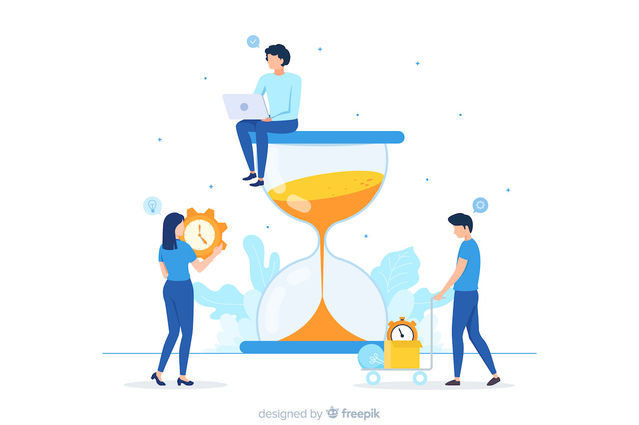Coronavirus Disease 2019
How to Stop Wasting Time During COVID-19
Treat your time like the valuable commodity that it is.
Posted April 27, 2020 Reviewed by Abigail Fagan

Like many other people, you might have suddenly found yourself with infinitely more time on your hands since the COVID-19 pandemic began.1 Numerous factors may be providing you with more time: You may have been unexpectedly laid off and now spend the 8 to 12 hours a day you would have kept yourself distracted now thinking about your professional loss. Or maybe you have a job you can, fortunately, do from home.
In any case, perhaps it has been more time than you know what to do with. And boy, is it boring. After all, sitting and doing nothing is painfully boring. In fact, so painful that people can and will administer electric shocks to themselves rather than sit alone in a room for 6 to 15 minutes just thinking quietly.1
Thankfully, there are endless YouTube videos, Instagram posts, video games, Netflix TV shows, Netflix movies, Netflix documentaries... and blog posts to fill your days in order to kill time and keep yourself busy. However, perhaps therein lies the problem in the way we structure our language around time. Why would we ever want to kill time? Or stay busy just for the sake of staying busy?
There are several reasons why we do this, not just during COVID-19, but in any "free" time.
1. Avoidance. We "kill time" while waiting at the DMV, waiting for our flight to board, or waiting for any scheduled event to happen. During unoccupied time, our attention tends to wander toward sensations of discomfort that we label as boredom, impatience, loneliness, anxiety, depression, you name it. If we would rather not experience these feelings, it makes logical sense that we would want to kill time.
2. A culture of productivity. And then there is "staying busy." The concept of staying busy takes many shapes and forms, but it generally implies any behavior primarily serving the function of avoiding the discomfort of not doing anything. There is discomfort that arises in the feelings of guilt and unease that show up when we are not actively doing something. Our thoughts tell us we are lazy, unproductive, and worthless in a way that reflects our societal pressure to be squeeze productivity out of every waking second.
This is naturally very stressful, so we scroll through Instagram to take our mind off of these negative thoughts. This goes well until we see a post of someone who has created a DIY rock garden out of recyclable materials, leading us to feel even more lazy, unproductive, and worthless for still being in our pajamas at 2 p.m. So we scroll through another post, and another one to avoid feeling bad about ourselves while seeing more and more posts that make use feel bad about ourselves.
3. Too many choices. We are bombarded with so many choices for how we can spend our time that we often default to doing what we have tended to do in the past out of habit or doing nothing at all. This phenomenon is called choice paralysis, demonstrated most famously in a study in which researchers found that customers in a store were 10 times less likely to buy jam when they saw 24 choices of jam than when they saw only 6 choices.2
This dovetails with Barry Schwartz's idea of people falling into two categories: satisficers and maximizers.3 When making decisions, satisficers tend to settle on choices that are good enough while maximizers push themselves to make the best choice. Studies have shown that though maximizers may have better outcomes, they are actually less happy with them. These same principles affect us in the drawn-out time of COVID-19 when the process of even picking which movie to watch can be a source of distress.
The question is, is all of this busyness getting us anywhere? After COVID-19 recedes, will we be satisfied with the choices we made for how we spent our time? We are working against a natural tendency to avoid feelings like guilt and anxiety, which bring us discomfort, a culture that stresses being productive, and a deluge of choices that make it hard to know the best way to spend your time.
Here are three cognitive strategies you can use to spend your time more wisely during (and after) quarantine:
1. Treat time like money.
With this new abundance of time, we don't have a good sense of how valuable it is. Imagine you have $10,000 in your bank account right now. How concerned are you about spending $100 on a purchase? Now imagine you have $100 in your bank account. How concerned are you about spending $100 now? You are much more likely to blow money when you suddenly find yourself with a lot (like on payday) than when you are pinching pennies at the end of the month. This is the way time tends to work as well. The more time we think we have, the more we take it for granted, and the easier it gets to accidentally waste it.
To avoid this pitfall, budget your time by writing down a schedule and giving yourself artificial deadlines. This will help you create a sense of scarcity, which will help you be more mindful of how you use your time. Just schedule one day at a time if you need to and see how much time you can save by working with 24 hours in your bank account rather than 10,000.
2. Change your relationship with time.
Instead of thinking of time like something that you kill when you have too much of it, treat time like your own commodity that you want to protect. Continuing with the metaphor of time as money, imagine that other people, screens, and substances are like advertisements telling us how we should spend our time. These things tell us it is a great use of our time to spend it and they do it in a very subconscious, convincing nature. We might be lulled into spending our time or money on something we did not really want to. Be mindful.
Also, practice gratitude for the time you have. This goes along with the idea of treating our time like it is a scarce resource, just like money. Do a thought exercise and imagine you have a year left to live. Imagine you had two weeks left to live. How would you spend your time? Here's another one: Imagine that in old age you are looking back on your memories of COVID-19. How do you want to reflect on this time and how you spent it? What is the story you want to tell that will reflect the type of person you want to be remembered as?
Your answers to these questions can help change your relationship to time in a way that allows you to prioritize and budget time in a more meaningful, intentional way. Every moment can be an opportunity to be grateful. See this TED Talk by monk David Steindl-Rast for more on that perspective.
3. Practice Saying "Good Enough."
It is easy to get caught up in procrastination and perfectionism during COVID-19. We may not be aware of how our actions might be driven by choice paralysis and a maximizer mindset in which we feel like we either have to do something perfectly or we don't do it at all. Perfectionism and procrastination are really two sides of the same coin. Practice being a satisficer. Practice telling yourself that this choice is good enough. Imagine that spending too much time trying to make a choice is the same as spending too much money on buying a product. Ask yourself what you really want to have spent your time on when you look back on it all. Practice looking at yourself and saying "good enough."
Staying busy can be an effective way to keep the monster of "I"m not good enough" at bay for a short period of time, but this monster tends to come back out when we can't keep ourselves busy, like right before we try to fall asleep. Instead of running from the monster, slow down, stop, turn around, and face the monster to say, "Hello there. I'm good enough. And I'm not going to be spending any more of my time on this discussion."
1 This excludes essential workers to whom we owe tremendous gratitude.
References
Iyengar, Sheena S., and Mark R. Lepper. "When choice is demotivating: Can one desire too much of a good thing?." Journal of personality and social psychology 79.6 (2000): 995.2
Schwartz, Barry. "The paradox of choice: Why less is more." New York: Ecco (2004).3
Wilson, Timothy D., et al. "Just think: The challenges of the disengaged mind." Science 345.6192 (2014): 75-77.1




